
Albanese says he’s ‘very comfortable’ with King Charles expressing views on climate crisis
The prime minister, Anthony Albanese, was interviewed by the BBC’s James Naughtie after his meeting with King Charles III.
Asked to describe what the conversation was like and how it went, Albanese said “it was very warm and friendly”.
Asked about the possibility King Charles could visit Australia early in his reign, Albanese said “he would be very welcome”.
“There will be a standing invitation for him, as there is for other members of the royal family.”
Naughtie also asked Albanese about the King’s position in relation to climate change:
Now, the King is now out of the political arena in the sense that he has to tread carefully on political issues that are matter for government. But everyone knows his commitment on these questions. No doubt you would hope that that is a conversation despite his accession to the throne that can go on.
Albanese:
I think that is a matter, of course, for King Charles, what he comments on. And it’s important that the sovereign stay distant from party political issues.
But from my perspective, what I’ve said, is that I’d be very comfortable with the King expressing views about the importance of climate change, and it is about the very survival of our way of life.
We know that in Australia the impacts of bushfires, floods, natural disasters, are doing exactly what the science told us would happen – which is that there have always been natural disasters in Australia, but they’re more frequent and they’re more intense, and that’s why this issue shouldn’t be a partisan political issue. It should be an issue which the world needs to confront.
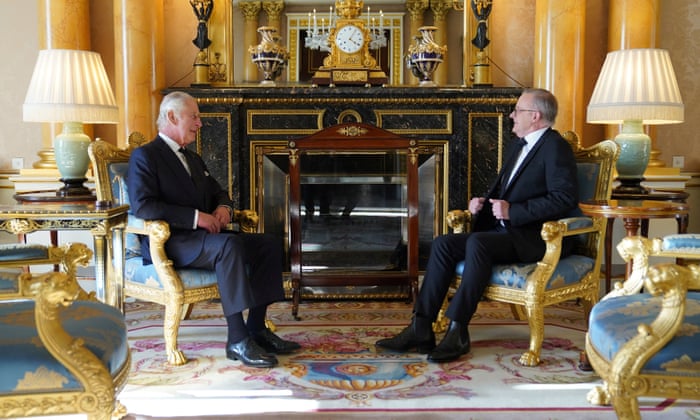
Key events
Flooding in northern Victoria
Moderate flooding is occurring along the King River in northern Victoria, while a warning is being issued for the state’s Loddon River.
Albanese says he’s ‘very comfortable’ with King Charles expressing views on climate crisis
The prime minister, Anthony Albanese, was interviewed by the BBC’s James Naughtie after his meeting with King Charles III.
Asked to describe what the conversation was like and how it went, Albanese said “it was very warm and friendly”.
Asked about the possibility King Charles could visit Australia early in his reign, Albanese said “he would be very welcome”.
“There will be a standing invitation for him, as there is for other members of the royal family.”
Naughtie also asked Albanese about the King’s position in relation to climate change:
Now, the King is now out of the political arena in the sense that he has to tread carefully on political issues that are matter for government. But everyone knows his commitment on these questions. No doubt you would hope that that is a conversation despite his accession to the throne that can go on.
Albanese:
I think that is a matter, of course, for King Charles, what he comments on. And it’s important that the sovereign stay distant from party political issues.
But from my perspective, what I’ve said, is that I’d be very comfortable with the King expressing views about the importance of climate change, and it is about the very survival of our way of life.
We know that in Australia the impacts of bushfires, floods, natural disasters, are doing exactly what the science told us would happen – which is that there have always been natural disasters in Australia, but they’re more frequent and they’re more intense, and that’s why this issue shouldn’t be a partisan political issue. It should be an issue which the world needs to confront.

Victorian dining and entertainment program returns
The Victorian government is bringing back its dining and entertainment program today, which allows customers to claim 25% cash back at businesses within the state.
The program will cover purchases of over $40 at restaurants and cafes, live music venues, museums and cinemas.
The first round was launched in March this year and saw $32m claimed within three months. Dumpling Alley was amongst the most popular dining venues, while Harry Potter and the Cursed Child was one of the most popular entertainment choices in the previous round, according to the government.

The $25m program runs until 16 December 2022 or when funds are exhausted.
The minister for sport, tourism and major events, Steve Dimopoulos, said:
With a blockbuster summer of major events upon us, we’re providing Victorians even more reasons to get out and enjoy everything the state has to offer – while saving money and supporting local businesses.

Peter Hannam
Where supply of housing is less flexible, mortgage debt is higher: RBA
The RBA’s Kearns, though, says that the higher interest rates will have varying effects on property prices (even if the precise impacts are uncertain).
He notes research by the RBA found that, all else being equal, interest rates can have larger effects on housing prices “in locations where the supply of housing is less flexible, mortgage debt is higher, there are more investors and incomes are higher”.
Back in April, we looked some of the areas where mortgage stress might be highest, and researchers pointed to outer suburban areas in particular:
When it comes to property prices themselves, the greater sensitivity is likely to be in the “most expensive areas”. Data showed prices in pricier suburbs are “more cyclical” than the average, Kearns said.
The biggest price changes, with higher rates, are likely to land in more expensive areas, the RBA. (That’s different from where financial stress will be the highest, though.) pic.twitter.com/0BeoniRVx5
— Peter Hannam (@p_hannam) September 18, 2022
Kearns added that evidence also exists to show houses are more sensitive to changes in interest rates than apartments. The limited supply of available zoned land partly explains this result, he said.
“Overall this indicates that an increase in interest rates narrows the distribution of housing wealth since more expensive properties experience a larger fall in prices,” he said, but adds the distributional effects are temporary and disappear over time.
Commercial property tends to be less affected than residential property to higher rates, Kearns said, although the unrelated working-from-home impacts might provide other headwinds for that sector.
Long queues for Qantas passengers at Sydney airport
Travellers with Qantas are once again facing long wait times, with 7 News reporting that many are worried about missing their flights at Sydney airport.
If you’re wondering why there seem to be so many problems across the aviation industry as it recovers from the pandemic, and when travel will get back to normal, yours truly looked at the issue in an article this weekend:

Peter Hannam
Borrowing costs just one of the factors affecting property prices
A couple of other takeaways from the speech by RBA’s Jonathan Kearns about the links between higher interest rates and property prices.
The uncertainty of those links can be seen in this chart from Kearns that underscores how volatile real estate prices are, not least because borrowing costs are just one of the factors affecting property (but arguably the biggest one):
As Kearns notes, interest rates affect all asset prices, including housing prices, because those assets are valued for what they provide us in the future.
“An increase in interest rates means that a given amount of income (or benefit) at a future date is worth less today, and so an asset with a fixed future stream of payments will be worth less today,” Kearns said, noting that future cash flows may also change with interest rates, amplifying or moderating the impact on prices.
As rates rise, the ability of people to borrow (and that’s what most of us do when buying property unless you have suitcases of cash under the bed), falls quite rapidly, as this chart shows:
Motorcyclist dies after hitting cow in NSW
A motorcycle rider has died after hitting a cow on the New South Wales mid-north coast yesterday.
Emergency services were called to an area about 30km south-west of Macksville after reports a motorcyclist had collided with a herd of cows on the side of the road.
NSW police said in a statement:
Witnesses rendered first aid to the rider – a 64-year-old man – before the arrival of NSW Ambulance paramedics; however, he died while being taken to Macksville Hospital.
Officers from Mid North Coast Police District established a crime scene and commenced inquiries into the circumstances surrounding the crash.
A report will be prepared for the information of the Coroner.
NSW rail union withdraws plan to shut down Opal machines
The NSW government and the transport union will be meeting this afternoon behind closed doors after the union announced yesterday they’ll be withdrawing their plans to shut down the Opal card system.
Last week the union announced their plans to shut down the Opal card system indefinitely as part of their ongoing dispute with the state government.
In a series of tweets by the union, they said that plan has now been cancelled, wider industrial action will still be continuing.
MAJOR ANNOUNCEMENT (thread)
1) Last week we tweeted that Opal gates would be turned off and opened indefinitely at train stations. This action has now been withdrawn.The broader industrial campaign continues. Keeping following us – this has long way to run yet. #nswpol
— Unions NSW (@unionsnsw) September 18, 2022

Peter Hannam
RBA economist says there is ‘considerable uncertainty’ about where property prices are heading
In a week that is likely to be marked by another week of overseas interest rate rises by central banks, Jonathan Kearns, head of domestic markets for the RBA, has chimed in about the connections between higher borrowing costs and property prices.
Those hoping for some definitive comments about how much rates might rise and how deep the dive in real estate prices will be, take a breath.
Kearns makes some interesting comments but doesn’t reveal much about what’s coming as far as higher rates. Nor does he go as far as his boss, RBA governor Philip Lowe, who last week noted he expected property prices to fall as much as 10%, as we reported.
Rather, there are these sorts of comments from Kearns:
[W]e know that higher interest rates will tend to depress residential and commercial property prices but there is considerable uncertainty about the magnitude and even the timing.
Not only can declining property prices have implications for economic activity, but also for financial stability as we outlined in the April financial stability review.
As we noted, those financial stability risks appear to be contained given the low leverage for residential and commercial property. But we will continue to carefully monitor the evolution of these risks.
Anyway, financial markets reckon there’s a 74% chance the RBA will lift the cash rate another 50 basis points at its board meeting on 4 October. That would take it to 2.85%, with another 100bp or more to come before it peaks.
Ahead of a week of overseas central bank activity, here’s how investors were expecting the RBA to go over the next year or so. They’re betting the cash rate will rise to almost 4%, with a 3-in-4 chance it will lift 50bp next month to 2.85%. pic.twitter.com/u7L21m8ts7
— Peter Hannam (@p_hannam) September 18, 2022
Commercial bank economists are more sanguine, expecting a peak at about 3.35%, or lower.
Stan Grant’s weekend piece ‘compelling and devastating’: Andrew Bragg
Liberal senator Andrew Bragg followed Khalil on ABC radio, discussing the news we brought you a little earlier that he is proposing a private member’s bill to tighten regulation on cryptocurrency.
At the end of the interview Bragg brought up Stan Grant’s analysis: “After Queen Elizabeth II’s death, Indigenous Australia can’t be expected to shut up. Our sorry business is without end.”
Bragg called Grant’s piece “compelling and devastating” and said the issues raised by Indigenous Australians shouldn’t be swept under carpet.
‘It is significant’: Khalil on Indian and Chinese concerns about Russia
Indian prime minister Narendra Modi and Chinese president Xi Jinping raised concerns about Russia’s war in Ukraine over the weekend.
Asked about the significance of this development, Khalil said “significant is probably an understatement.”
It is significant. The question in my mind is if chairman Xi is really having those concerns because Russia is failing so badly.
From the perspective of India it’s significant, because India has a long standing relationship with Russia – it goes back historically.
I think significant is probably an understatement in terms of the concerns you’re seeing from those big major powers.
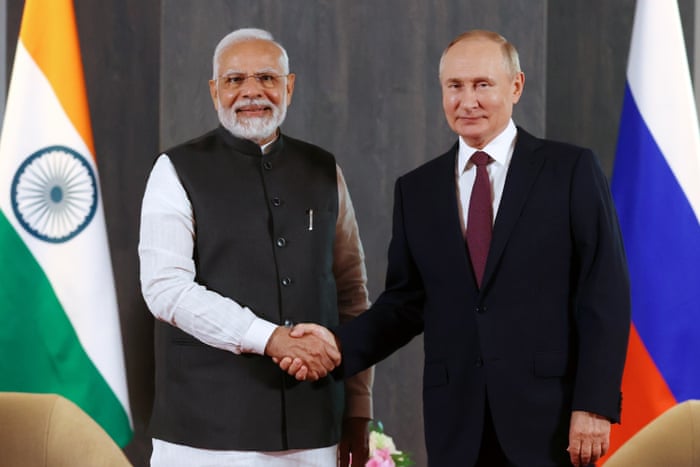
Khalil says Inter-Parliamentary Alliance on China meeting focused on defending democracy
ABC radio asks Khalil about his recent trip to Washington DC for a meeting of the Inter-Parliamentary Alliance on China.
The focus was on particularly how we develop policy around China. It’s about the commitment we have as democracies to the rule of law.
As lawmakers we have a lot of challenges, not just from state actors like China and Russia but also non-state actors, in defending democracy in a period of time when there’s a lot of disinformation.
New intelligence committee chair says priority is ‘the best national security laws’
Labor MP Peter Khalil has been appointed the new chair of the parliamentary joint committee on intelligence and security, and is speaking to ABC Radio about the appointment.
RN Breakfast host Patricia Karvelas asks Khalil about what he wants to achieve as chair of “one of the most powerful Committees in the Parliament”.
Khalil says he has two principle objectives:
There are two objectives really of this committee. The first is that we pass as a parliament – the best national security laws.
Secondly, it is a critically important committee as you said we are charged with the responsibility of reviewing and oversight of all our national security laws … and also an assessment around intelligence and security agencies.
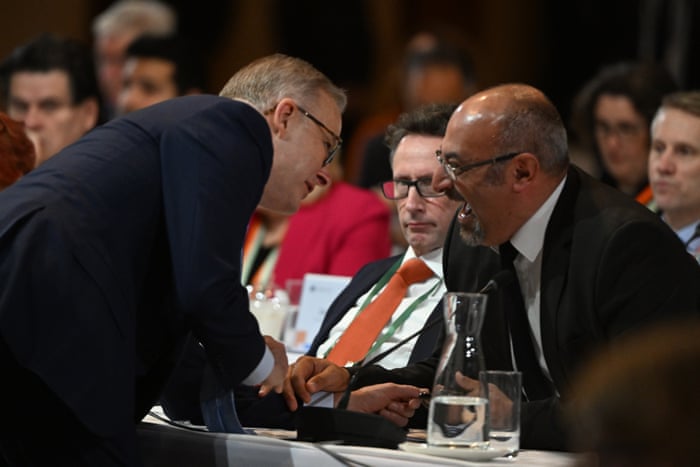
Western NSW town to be cut off by flood waters, as warnings also issued for Victoria
The town of Wee Waa in north western NSW is preparing to be isolated for up to a week after flood levels reached 6.7 metres over the weekend.
Several roads in the region have been closed, with major flooding along the Namoi River at Gunnedah being closely monitored.
State Emergency Service spokesperson David Rankine told the ABC that local units have been preparing for roads into the town to be cut from tomorrow. He said:
Wee Waa could be cut off for a few days from tomorrow into Tuesday.
More flood warnings have also come through overnight for the King River in Victoria:
Liberal senator pushes for cryptocurrency crackdown

Josh Butler
The Liberal senator Andrew Bragg has proposed a private member’s bill to tighten regulation on cryptocurrency, to address what he calls a “Wild West situation” created by current laws.
Bragg, a senator for NSW, is pushing for a new system for licensing digital asset exchanges, including rules mandating that cryptocurrency companies keep currency in reserve in an Australian bank in a bid to give consumers more protection in the case of the collapse of an exchange.
He said there were both “risks and opportunities” for Australia in further embracing digital assets, and has long advocated for new rules to support the country becoming a leader in crypto. In a speech to a blockchain forum on Monday, Bragg noted the “endless advertising of crypto throughout the football finals” and called for the government to take action.
Bragg was chair of a Senate committee that investigated cryptocurrency issues last year, and said the former Coalition government had been committed to implementing proposals to further regulate the market.
His proposal, the digital assets (market regulation) bill 2022, would create licensing schemes for digital asset exchanges, digital asset custodians and stablecoin issuers.
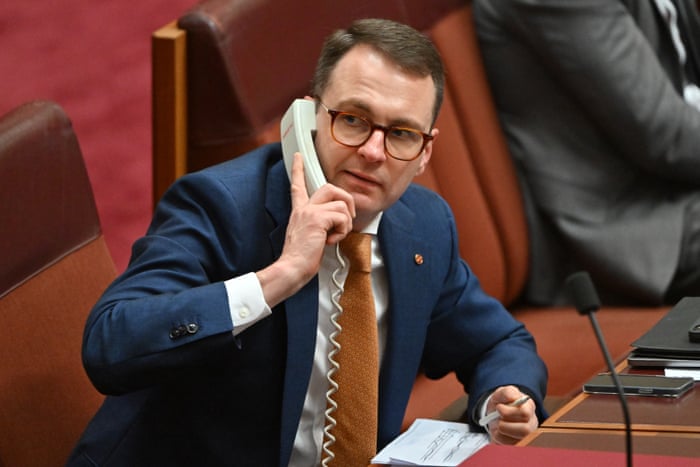
The licensees would be subject to minimum capital requirements, conduct regulation and governance, requirements to segregate consumer funds from corporate funds in the event of an exchange declaring bankruptcy, cyber security standards, disclosure requirements to government agencies, and requirements for key personnel to be based in Australia.
Bragg said:
Waiting is not an option and Australian consumers are exposed to an unregulated market as we speak.
At the moment Australians face a gaping hole in that investment in a financial product is protected by regulation whereas a similar looking crypto product is not.
Bragg was critical of the Labor government for announcing further reviews into cryptocurrency, instead of taking swifter action. He said:
The consequence of Labor’s inaction is clear. Australia is falling behind on consumer protection and investment promotion.
Covid response to be boosted with extra $1.4bn

Josh Butler
The federal government is pouring in another $1.4bn to Australia’s Covid response, with $840m going to aged care alone.
The major pandemic announcement will be confirmed on Monday morning by the health minister Mark Butler, at a press conference in Adelaide. Numerous measures in the federal Covid response were due to run out by 30 September, but Monday’s announcement extends several key programs.
The aged care support program – which funds extra cleaning, staff wages and training, waste removal and infection control measures – will get $840m. Of that, $35m will extend ongoing on‑site PCR testing.
The latest federal Covid snapshot for aged care, as of 14 September, reported 40 resident deaths and 1,580 combined new resident and staff cases in the prior seven days. There were 270 facilities with an active outbreak at that date, down 70 from the previous week.
Active aged care outbreaks have been trending down steadily since a peak in late July, and are now at the lowest level since January.
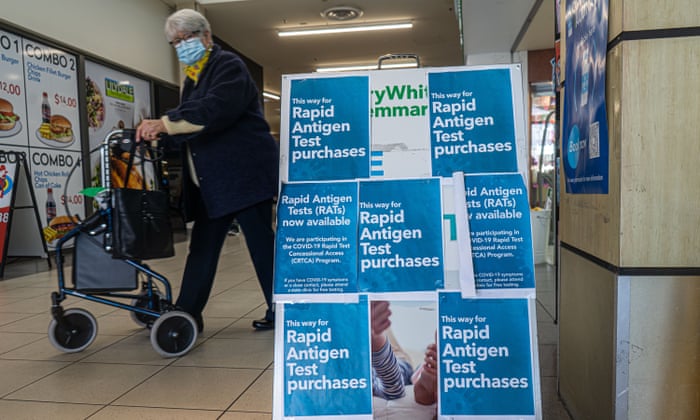
Butler’s announcement will also include $235m for PPE, treatments and rapid tests for aged care, disability care, frontline workers and First Nations health services; $115m for rapid antigen tests to high-risk settings including aged care; $142m in Medicare Benefits Scheme items for Covid tests and anti-viral prescriptions; $48m to extend 100 respiratory clinics; and funding for communication campaigns around Covid.
Last week, national cabinet agreed to extend the pandemic leave disaster payment for workers who had to isolate but didn’t have sick pay. Butler said the federal government would “continue to review the Covid-19 response measures, according to expert advice, as it develops a long-term strategy for managing the pandemic”.
Butler said:
This action will provide Australians with effective testing, medical care and treatments to protect themselves and those most vulnerable in the community.
Good morning!
In London, the prime minister Anthony Albanese has attended a reception for world leaders hosted by King Charles III at Buckingham Palace, ahead of Queen Elizabeth II’s funeral.
Albanese has also met with his counterparts from the 14 Commonwealth realms, including Canadian prime minister Justin Trudeau yesterday.
The health minister, Mark Butler, will today announce the government is allocating another $1.4bn to the nation’s Covid-19 response, with $840m going to aged care alone.
Many measures in the federal Covid response were due to run out by September 30, but today’s announcement will extend several key programs.
The government is consulting on new laws to boost work security, including minimum wages and other entitlements for gig workers, in what the ABC is reporting as an “Uberisation” overhaul.
The Liberal senator Andrew Bragg has proposed a private member’s bill to tighten regulation on cryptocurrency, to address what he calls a “Wild West situation” created by current laws.
If there’s anything you think should be on the blog, you can ping me @natasha__may on Twitter or email natasha.may@theguardian.com.
Let’s get going!


